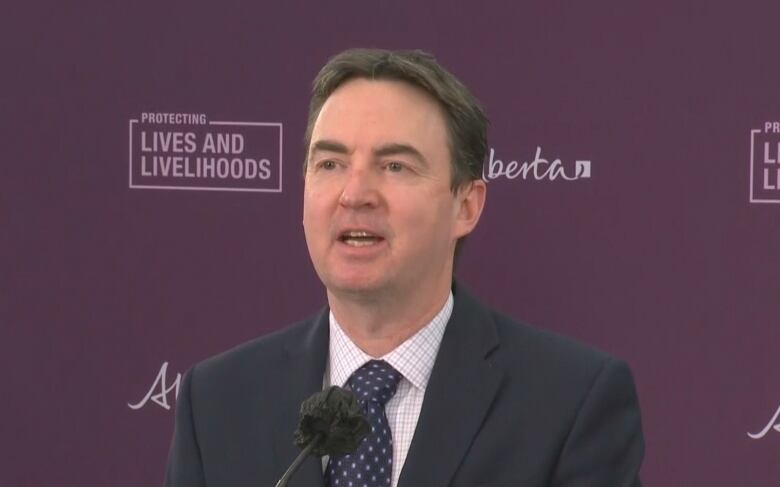Parts of controversial Alberta UCP labour law remain in limbo
Two independent MLAs slammed the government for leaving law unproclaimed

A new law that requires workers to opt into paying union dues to political campaigns or charity donations remains inactive more than a year after legislators approved it.
Two independent MLAs who were removed from the government caucus earlier this year drew attention to the issue on Wednesday, alleging the delay is allowing unions to influence elections scheduled for October.
Cypress-Medicine Hat MLA Drew Barnes said the United Conservative Party government's delays could see union members' dues flowing to third-party advertiser campaigns for city council or school board candidates they oppose.
"As broken promises go, this is a big one," Barnes said at a news conference. "For far too long, union members have been forced to fund political spending for candidates and causes they personally disagree with, or even oppose."
Central Peace-Notley MLA Todd Loewen said he worries union-funded campaigns will influence a referendum on whether Albertans support the principle of equalization. That question, along with a referendum on daylight saving time and senator elections are all on the municipal election ballot set for Oct. 18.
The pair's public criticism of the premier's leadership and some of his policies prompted caucus colleagues to expel them in May.
Loewen said the low popularity of Premier Jason Kenney combined with political campaigns could prompt people to reject the equalization question, which he said would be "devastating" for the province.
Labour groups and corporations are banned from making donations directly to civic or provincial candidates in Alberta.
However, they can register as a third-party political advertiser, or donate to a political action committee. Before those donations were banned, Alberta unions did endorse and donate to some civic candidates.
As of Wednesday, the only third-party advertiser registered with Elections Alberta with an obvious tie to a referendum campaign was the Society of Albertans Against Equalization.
Canadian Taxpayers' Federation Alberta director Kevin Lacey said federation staff started the society.
The Alberta Union of Provincial Employees said in a statement the union has no advertising plans for the civic election or referendum.
The Alberta Federation of Labour did not answer questions about any campaign plans for the October votes.

Joseph Dow, press secretary to Labour and Immigration Minister Jason Copping, said the government will keep its election promise to make union dues optional for political causes. The government is consulting on and writing companion regulations, he said.
Dow did not give a date for the rules to take effect.
Law likely to face legal challenge
Bill 32, the Restoring Balance in Alberta's Workplaces Act, was a contentious, omnibus slate of changes to laws affecting workers.
The portions already in effect put new limits on where union members can picket, allow 13- and 14-year-olds to work in more roles, and changed the rules around layoffs and terminations, among others.
Not yet in force are rules requiring unions to calculate and disclose what proportion of dues are used for political activities and other causes.
It will make Alberta unions the only ones in Canada required to categorize their expenses and ask workers to opt into paying dues toward political campaigns. Unions would also have to disclose financial statements to all of their members.
An analysis by Athabasca University labour relations Prof. Jason Foster describes the potential effects on union finances and operations as severe and intrusive.
The Alberta Federation of Labour said it plans to challenge the law in court, once proclaimed, including the sections on union dues.
NDP labour and immigration critic Christina Gray said employers are telling her the new rules are cumbersome.
"What we're seeing is the UCP government is interested only in suppressing the voices of working people," she said.

